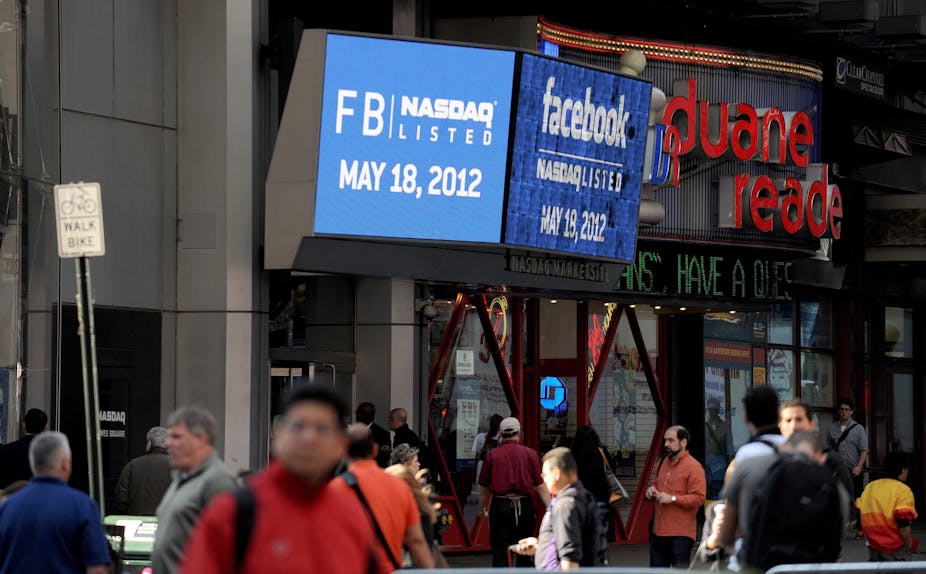What do you get when you buy 900 million user experiences, mostly from smart devices?
Facebook’s float has been dogged with controversy: on Monday, its shares plummeted 11% and dropped another 8.9% to close at $31 per share, off it’s Friday launch price of $38 per share.
But while the performance of Facebook shares might have fallen short of expectations, there was still plenty of interest in the social networking company, despite the difficulty of determining the real face value of the new company.
Social networking design involves understanding groups and how people behave in groups. It also involves having a good understanding of ICT and networking technology and how aspects of that technology affect a user’s experience.
In Facebook, it’s main value in my opinion is that user experience and its contribution to sustainability. The user experience can vary from the simple but popular ability to reconnect to family and old friends that attracts many users or the latest experience offered by the Timeline profile feature.
Regular Facebook messages to members, promotions, Facebook apps and events have all helped to develop relationships. These rituals are often of a tribal nature and have all helped develop a mature online culture. Now it’s large community size can also sustain many viable sub-groups.
Facebook’s listing on the Nasdaq Stock Exchange on Friday with more than 570 million shares traded set a new record for a US stock debut. This “Faceboom” was hardly surprising after all the hype surrounding the initial public offer.
The face value of Facebook for a new shareholder is rather esoteric as the value of such a volatile business model may be only understood by so few of all the investors or company directors.
Everybody knows Facebook for one reason or another and investors are always looking to get in early on the next big thing. Social media is a huge marketplace that uses networks of friends or associates – a network of people networks. News Limited, Microsoft and Google have all tried to work their way into the social media economy.
Its all about the timing, but these days no time is ever perfect with the Euro crisis and US car manufacturer General Motors showing disappointment in the company’s Facebook profile in not leading to improved car sales.
One of the lingering issues for Facebook is it own reputation which at times has been like a roller coaster ride.
The ability to take an event, product or service and make it go “viral” in the social media marketplace is a double-edged sword, affecting not only business pages but Facebook itself. So far it has survived some potentially damaging issues, but will it remain as resilient as a company which will expose Facebook to a set of commercial law restrictions?
The fact it has 900 million users is too big to ignore, but Facebook has a fluid dynamic unlike most successful IT companies. In the field of social informatics, any successful social network like Facebook has to offer something special and renew itself regularly.
Nurturing its members with its interface and range of ways to interact, communicate and share files and applications is all part of its overall value or usability to the members. All of Facebook’s services support sociability and a resolve to build and maintain the lead over rivals by reputation and trust. Facebook’s sociability is a result of its social policies and plans for fostering future social interactions.
The estimated value of Facebook at $18 billion is modest compared to other IT companies. It’s a bit like comparing apples to oranges but perhaps Google and Yahoo are a loose benchmark for comparison. Google is valued at about $203 billion at $623 per share - that’s less than half the value of Apple at $495 billion and even the struggling Yahoo comes in at an $18.2 billion.
The early volatility of trading days was expected by many and may continue to fluctuate in the short term as some of the members may not want to be part of the company and so part ways, while others may be attracted buy shares.
But Facebook has evolved as an environment of self-ownership and group empowerment. Now it will mutate, as being a company listed in the stock market will alter its roles, governance and the rules of engagement for members.
Facebook has developed as an “environment of self-owners” which may be in conflict with the newly corporatised Facebook company.
One of the new roles for some Facebook members is that now they will act as both a member and investor. That in itself, will change how the social network operates.

